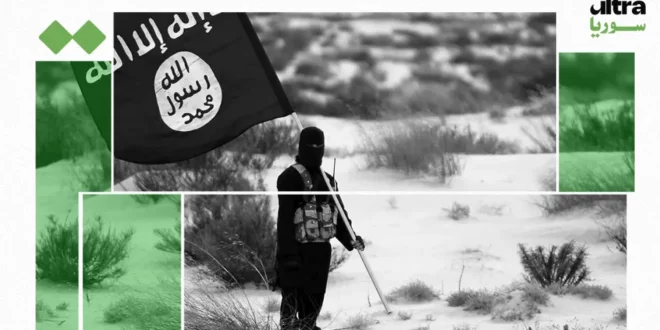A few days after the body of a General Security member was found shot near the town of Nahta in Daraa countryside in mid-September, ISIS released a video showing the field execution of the same young man, who had served in the General Security forces during the clashes between local tribes and fighters from the so-called “Military Council” in Suweida. Analysts viewed the incident as an announcement of ISIS’s arrival in Daraa and its renewed ability to spread and carry out operations for the first time since the fall of the Assad regime on December 8, 2024.
Although there are conflicting accounts about whether the slain man had prior ties to ISIS, the episode nonetheless confirms the group’s growing presence across several provinces. In recent months, ISIS has claimed responsibility for a string of attacks — including the bombing of St. Elias Church in Damascus on June 22, a car bomb targeting a security site in Deir-ez-Zor on May 18, and an attempted attack near the Sayyida Zainab shrine. Meanwhile, the Interior Ministry has repeatedly announced the arrest of ISIS members, suggesting a noticeable resurgence of the organization.
Re-emergence in the South
Military and strategic analyst Mahmoud Abdelsalam notes that ISIS has taken advantage of the security vacuum following the regime’s collapse to reposition itself across several provinces. The ensuing chaos, he says, created a fertile environment for its cells to reconnect and coordinate, especially amid the widespread circulation of weapons after army units abandoned many bases. The wave of recent terrorist attacks, he adds, points to this reactivation.
According to Abdelsalam, several factors are facilitating the group’s resurgence in the south — most notably its deep familiarity with the terrain, having maintained a stronghold for years in the Yarmouk Basin until the regime’s fall. Moreover, Israel has effectively aided ISIS by keeping the area demilitarized, allowing the group greater freedom of movement and access to new geographic corridors under an Israeli security umbrella.
Political researcher Mohammad Abu Sharifa observes that ISIS is now clearly seeking to strengthen its presence across a broad geographic arc, from the Syrian Desert to the Suweida steppe and deeper into the south — an area that has seen growing instability for months. He points out that the group has recently stepped up its online activity, particularly in relation to southern Syria.
Favorable Conditions for the Group
Abu Sharifa believes that weak security deployment in southern Syria is one of the key reasons behind ISIS’s spread. These “soft security flanks,” as he calls them, offer an ideal environment for infiltration. The group, hostile to the new Syrian administration, is exploiting the ongoing security talks between Damascus and Israel regarding the demilitarized southern zone — using this restriction on Syrian military movement to its advantage. In Suweida, ISIS has even inserted itself into local security turmoil, committing massacres that further complicate the situation for the government.
Abdelsalam adds that ISIS is also exploiting both security and social conditions to re-expand. On the military side, the group benefits from ideological fragmentation among factions affiliated with the Defense Ministry, attempting to recruit disaffected fighters and exploiting the army’s limited reconnaissance capabilities.
On the social front, he says, ISIS capitalizes on the population’s dire economic hardship to recruit local youth, reviving what it calls the “Horan Emirate.” Abdelsalam warns that Israel may be using the group as a strategic pressure card against Damascus, reinforcing its presence in the border zone.
The War on ISIS
Abu Sharifa cautions that neglecting the ISIS issue in southern Syria could turn the region into a factory for exporting terrorists, a training ground for killers and bomb-makers — in direct violation of the counterterrorism obligations imposed on the Syrian government. Beyond the security implications, this would also erode the region’s social fabric and civil peace, placing the country’s overall stability on shaky ground and complicating Damascus’s efforts to re-engage with the international community.
Abdelsalam concludes that the only effective solution lies in striking ISIS’s supply lines in the Syrian Desert, conducting proactive surveillance across all provinces, and promoting social awareness among communities to counter the extremist ideology the group continues to spread among youth.
 Eurasia Press & News
Eurasia Press & News




